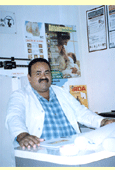
Involving Communities in Quality Services
“Our job is to ensure that our community members get the quality services they need. If someone is dissatisfied with the attention they receive in the clinic, they come to me and I help solve the problem.”
As a member of the Clinic-Community Committee, Juana Tavarez meets regularly with the staff of Centro Diagnostico, a family planning and reproductive health care clinic on the outskirts of the Dominican Republic’s capital city, Santo Domingo. Juana’s neighbors know they can tell her about their expectations and experiences with clinic services and that she will make sure their concerns are addressed by clinic staff.
The PRIME II Project is using its Consumer-Driven Quality (CDQ) approach to assist Centro Diagnostico’s administrators in identifying and implementing effective tools to gather and apply such consumer input. Dialogue with community spokespersons like Juana Tavarez recognizes client satisfaction as an essential component of the clinic’s strategy to ensure financial stability by providing high-quality, accessible services. “Involving people from the community is critical,” says clinic director Dr. Jose Gregorio Aponte, “because they will always have the best idea of how to better their own quality of life.”
To introduce community leaders to Centro Diagnostico and the CDQ concept, PRIME II helped organize five meetings in the neighborhoods surrounding the clinic. A series of six participatory group activities, adapted from PRIME partner EngenderHealth’s Community COPE methodology, were then held to collect consumer feedback about reproductive health needs and perceived barriers to services, and to identify community spokespersons. Another series of meetings brought these community spokespersons and clinic staff together to clarify their roles in the Clinic-Community Committee.
Opened in October 2001 to serve residents of low-income neighborhoods, Centro Diagnostico is operated by ADOPLAFAM, a nongovernmental family planning organization. Recognizing that one of its major donors, USAID/Dominican Republic, is reducing overall population funding, ADOPLAFAM set a goal of having 70% of the clinic’s clients pay full fees. Coupons for free services were made available, however, to get Centro Diagnostico off the ground, and only 28% of clients were paying for services as of December 2001. Exceeding expectations, the number of clients attending the clinic more than doubled between the first trimester and second trimester of 2002; by August, 83% of clients were paying for services and monthly clinic income was almost twice the total from January. “The increase in patient numbers and income is a result of all the community work we have done,” attests Dr. Aponte.
The willingness of clients to pay for family planning and other reproductive health services can be related to the perceived quality of those services. At Centro Diagnostico, requests gathered from community members during CDQ activities have resulted in direct improvements to the clinic. Two additional gynecologists, including a female, have been added to the staff, along with a cardiologist and two psychologists. A ceiling has been completed and curtains installed to ensure privacy in examining rooms, a television and VCR showing educational videos have been set up in the waiting room, and a generator has been purchased to ensure electricity for cold storage so that free vaccines can be offered.
“With PRIME, we have gone to places and reached communities that I had never worked with or met before,” says Reina Gomez, a volunteer health promoter with ADOPLAFAM for 13 years. “We work much more with neighborhood leaders, Parents and Teachers Associations… and this, to me, is invaluable. It’s great to work with a project that completely supports and encourages community work.”
The PRIME II Project works around the world to strengthen the performance of primary-care providers as they strive to improve family planning and reproductive health services in their communities.
PRIME Voices #14, Dominican Republic: Involving Communities in Quality Services, 11/14/02.
Photo Credit: Laura Murray
|













